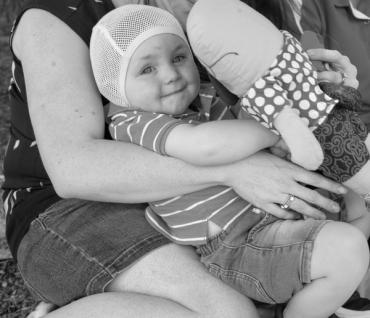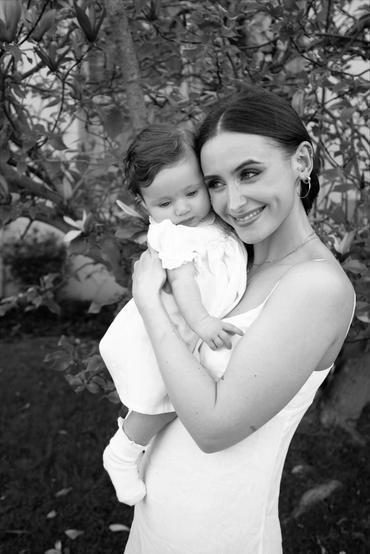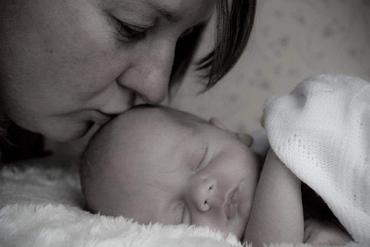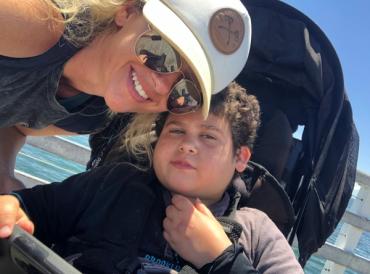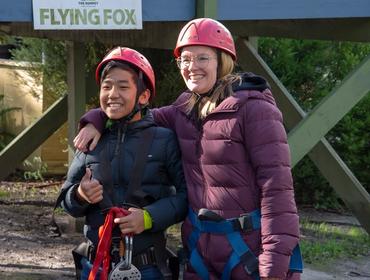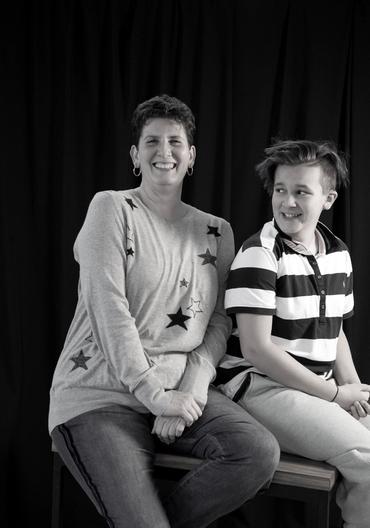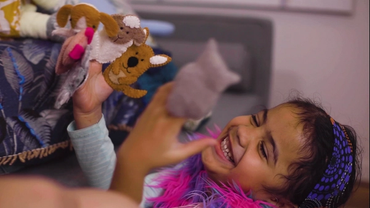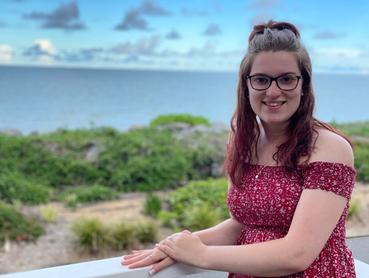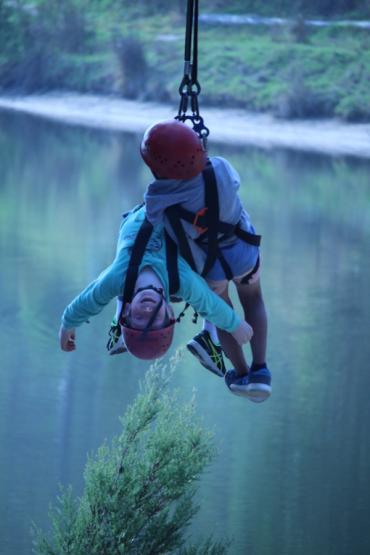Content Finder
There is a great deal of information available on the internet about deafness. We have collected a range of the key subjects parents told us were important to them - and you can check these out right here. Just use the drop-down filters to help focus on what interests you and we will feed in the relevant content.
My Story, Growing up Deaf - Imogen
Say hello to Imogen - Animal enthusiast, social butterfly and competitive athlete shares her story about growing up deaf.
First Signs - baby sign language
At around four to seven months of age, in the same way hearing babies begin to babble vocally, babies acquiring sign language begin to babble on their hands.
My story, my career path - Jamie Hannah Lane
Jamie works as an employment consultant with Sign For Work at Deaf Children Australia. Jamie shares her experience growing up to inspire the new generation of deaf or hard of hearing young people to achieve their goals.
Karla - My son, our Story
Karla shares her family's story about navigating the early days of diagnosis and how valuable connecting with other parents raising a deaf or hard of hearing child was to their unique journey.
Christine - my family's journey
Christine shares her family's courageous journey navigating the complexities of raising a child with hearing loss and how that has strengthened their family unit.
In the news
Keep an eye out for interesting news articles here!
Emma and Darcy - our story
Darcy has a profound hearing loss - bilaterally.
Moana Lynn’s Story by Kyleigh... her mum.
Moana Lynn has severe to profound deafness because of a genetic factor: Connexin 26 mutation.
My Story, Growing up Deaf- Tayla Percy
Tayla is studying her Bachelors of Youth Work and aspires to be an advocate and role model to other Deaf people.
My Story, Growing up Deaf- Lachlan Johnson
'I'm extremely proud of my Hard of Hearing identity. I probably wouldn't be the mentally strong and confident person I am today without my hearing loss journey'.
Aleisha - my story as a mum in Queensland
Aleisha has two children, James who is 8 and Emelia who is 6. Emelia has a bilateral sensorineural mild to moderately severe loss.
About assistive listening devices.
Here, we’ll talk about sound amplification systems. These are often used in noisy environments, such as school classrooms, to help a child hear better.
About Platypus Playhouse
Check out the range of Platypus Playhouse resources- a range of tactile and visually splendid language building tools.
Hearing tests- what to expect, what to look out for
Routine hearing tests are recommended for children of all ages. In Australia, we have free hearing tests conducted on all newborns. However, as your child grows their ability to hear can change quickly and hearing loss can develop at any stage. Aim to be vigilant for any signs of hearing loss.
Early childhood development - building foundations...
A child’s early years are a critical period for communication, language, and social-emotional development and lay crucial foundations for future learning and forming of identity.
Discover more about Auslan
Auslan (Australian Sign Language) is central to a bimodal bilingual approach for your child. Find out more about Auslan below plus links to Auslan providers. You can find links to Auslan tutors on the 'Service Finder' page.
Early Childhood intervention can make a difference
Early intervention aims to give your child the best possible start in life by supporting them to develop vital communication skills. It should start as soon as possible after your child has been diagnosed with a hearing issue.
Fact checks
Here are some some facts and figures to help combat misinformation that can be found on the internet.
Shannon - my story as a mum
Shannon's youngest son was diagnosed at birth with mild to moderate bilateral sensor neural hearing loss and he was aided at 3 months old.
Early signing. Hints, links and more
Within weeks of birth, babies start discovering the patterns and rules of the language used around them. This is true whether that language is spoken or signed.
My Story, My Career Path - Nathan Borg (actor in Neighbours)
At 3 months old Nathan contracted bacterial Meningitis and as a result Nathan is profoundly deaf.
My Story, Growing up Deaf- Nicholas Layton
Meet Nicholas. He's in his final year of high-school and has a passion for art. His recent achievements include breaking Deaf World Records in swimming!
My story, my career path - Joshua Ker
Joshua is a disability employment consultant at DCA and Personal Trainer (on weekends!)
Hannah and Hayden - our story
Hayden has a bilateral, moderate, sensorineural hearing loss.
Stacey- my story as a mum raising a deaf child
Stacey is mum to three gorgeous children. Stacey's youngest daughter has a bilateral, sensorineural, moderate-to-severe hearing loss. This is the story of their journey.
Causes of deafness - a summary
If your child has been diagnosed with deafness, it’s understandable you’d like to know what caused it. The causes of hearing loss are divided into two categories – congenital and acquired.
Who do I need in my support team? Hints, links and more.
If you have a child who’s deaf or hard of hearing, it’s important to build a team around you who can support your journey. Your family are at the heart of that team, which will also include a range of health and education professionals.
Steps to starting your NDIS journey- Questions & Answers
There's a lot to consider when your child has been diagnosed with a hearing loss. When it comes to the NDIS, there may be extra matters to think about. We've spoken to parents about the common questions to ask when you first engage with the NDIS.
My Story, My Career Path- Victor Belousov
Victor is a Youth Support Worker at Deaf Children Australia and has achieved a Bachelors in Information Technology and Systems. In his spare time he loves to mountain bike and travel.
Bimodal bilingual choices.
One of the earliest choices you’ll need to make is how you’ll communicate with your child. Finding a form of communication everyone in your family can understand is very important. Your choice should reflect what’s best for your child and family.
Top Ten Burning Questions
When we created this website, Deaf Children Australia wanted to be sure we addressed what was most important to parents and caregivers of a child recently diagnosed as being deaf or hard of hearing. We published a survey inviting 500 participants and more than 70% of respondents were parents telling us what they most wanted to know, or worried about, when they first received their child’s diagnosis. Here are the top 10 responses we received, with some answers and links to other helpful resources.
My Story, my career path - Tamara Trinder-Scacco
Tamara is the Community Engagement Manager at Deaf Children Australia. She shares her story about living with hearing loss and how it's helped shape her journey.
Bianca - my story as a mum
Bianca is a mum raising a deaf child. She shares her and her family's story in hope that it will help other families raising a deaf or hard of hearing child, embrace their newfound life.
Communication in the family - some tips to help...
From the moment they’re born, every child is wired to explore their world and build relationships with people. To do this effectively, children need skills in language and communications.
Henry and Davie - our story
Davie has a “bilateral conductive hearing loss” to a profound level. Henry (father) tells us about navigating the early days as a family.
Jenna - my story as a mum
My daughter has profound bilateral sensorineural hearing loss.
Jodie - my story as a mum in Victoria
Jodie's daughter was nine and half years old when finally diagnosed.
Dr Elizabeth Levesque
Dr Liz Levesque has helped us develop some of the content for Flying Colours and Platypus Playhouse. Her insights have added very real value to our content.
Early intervention is a great way to start
Your child’s early years are a really important time for communication, language, and social-emotional development. This is your opportunity to lay crucial foundations for future learning and the forming of your child's identity.
First Diagnosis? Here are some tips on what to do next.
Receiving the news that your child is deaf or hard of hearing usually comes as a shock, especially since 90 percent of these children are born to hearing parents. For many such parents, their child is the first person they’ve met who is deaf or hard of hearing. This can make it hard to put the news into perspective. Here are some important steps to take now you’ve received your child’s diagnosis.
Types of deafness - a summary
Deafness and hearing loss are described in many ways. Here’s an overview of the types of hearing loss and some of the terms frequently used to talk about it.
Hearing aids - a brief summary
Hearing aids might be recommended to give your child the best chance of hearing what’s going on around them, especially speech.
15 Myth Busters!
As you navigate through this different world you will see, hear, read, unearth and discover varying views and perspectives. Here are some myths we have heard - and check out these busters!
- article
- All About Deafness
What do audiologists do?
Audiologists are highly qualified allied health professionals trained to assess, diagnose, and treat hearing loss.
What do early intervention specialists do?
Early intervention aims to give your child the best possible start in life by supporting them to develop vital communication skills. It should start as soon as possible after your child has been diagnosed with a hearing issue.
What does a speech pathologist do?
Speech pathologists (also sometimes called ‘speech-language pathologists’) are university-qualified allied health professionals who work with people experiencing communication difficulties.
What do occupational therapists do?
Occupational therapists are university-qualified allied health professionals who help people improve their everyday function.
What are special needs schools?
Australia has both government and independent specialist schools for children with complex educational needs, including children who are deaf or hard of hearing.
What do child psychologists do?
Psychologists are university-qualified health professionals trained to support people with their thoughts, feelings, behaviours and learning.
What is NDIS support coordination?
Under the NDIS, support coordination is about strengthening a participant’s ability to coordinate and use supports in their plan and participate more fully within their community. It should help you optimise your plan to make sure you’re getting the most from your funded supports.
What does early education mean?
Early childhood education and care services allow children to engage in play and learning opportunities with their peers before starting formal schooling.
My child is deaf and has additional needs.
It’s estimated up to 40% of children who are deaf or hard of hearing have additional needs. These can be related to health, social and/or educational development. The accepted term when referring to deaf and hard of hearing children with additional needs is 'deaf plus'.
My story, my career path - Brent Rogers
Brent is an employment consultant. He enjoys reading and is passionate about teaching Auslan.
My story, my career path - Laura Sampson
Laura is an NDIS Support Coordinator. She has a passion for working with families and helping children reach their potential.
My story, my career path - Jules Batstone
Jules works full time and is a Senior Producer for Pollen, an award winning digital agency. He is deaf in one ear.
My story, my career path - Melonie Harpham
Melonie is a Sign For Work Employment Consultant. Her journey with hearing loss began when she was 5 years old.
All about cochlear implants
Cochlear implants might be an option if your child has permanent severe or profound hearing loss or has had limited success with hearing aids. Here’s some information to help you understand what they are, how they work, and whether your child might benefit from them.
About hearing loss - a summary
If your child has recently been diagnosed as being deaf or hard of hearing, you’ll hear a lot of new terminology that may sound confusing and even a little intimidating. It helps to understand a bit more about hearing loss, and the terms hearing professionals use to talk about it.
Choosing a school? Ask the right questions.
Let’s face it—school is a big part of life for kids and young people. You’ll want to find one where your child can flourish and be happy. Here’s some tips for choosing a school that’s a good fit for your child and family.


